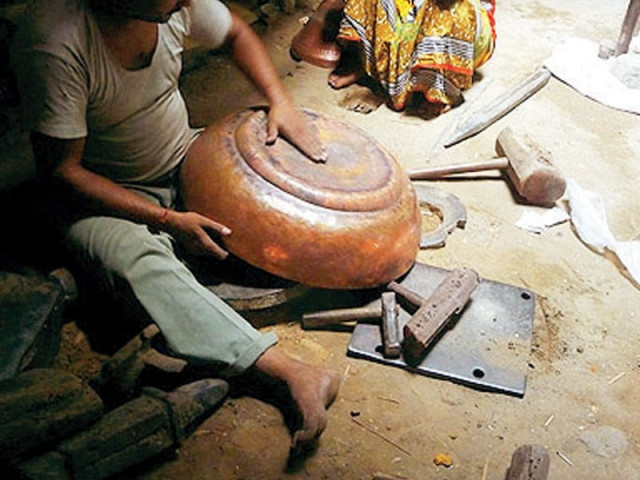Once buzzing with its brass business, Peetal Gali is breathing its last
Peetal Gali is a centre of making utensils and decoration pieces from brass and copper.

Once buzzing with its brass business, Peetal Gali is breathing its last
Arts and craft represent historic and artistic background of a nation and give it identity. They support the progress of certain industries and thus provide employment. They also promote national culture, attract tourists and bring foreign exchange into the country.
But in many cases, cottage industries like carpet weaving are suffering and slowly moving towards extinction.
One of such arts which seems to be breathing its last is the one practised by the brass workers of Peetal Gali in Karachi. Peetal Gali, as the name says, is a centre of making utensils and decoration pieces from brass and copper. Most of the artisans originally migrated from Muradabad, India after 1947 and have been plying trade at the same place over the decades.
But while, at one time this was a thriving business, with both local and foreign demand, it is now dying a slow death. Lack of government patronage was always a problem, but one that the untiring artisans managed to rise above. However the added evils of terrorism, inflation and the erosion of buying power have been like a death knell.
The craft is tottering at the verge of extinction and many shops have been taken over by other businesses. Where at one time there used to be over a hundred shops related to this craft, now there are just 10.
The owner of Shamim Handicrafts, told The Express Tribune that the ethnic and sectarian strife which has marred life in Karachi for many years was the prime cause behind this. His family has been involved in brass and copper making for three generations but now he feels his children would be better off doing something else.
Government apathy
In the absence of any government patronage the few remaining artisans say they are being exploited by private parties who buy their products at low rates and then export them to earn significant profits. One such craftsman, Muhammad Aslam who works with his elder brother and his nephew is an expert in casting items from silver, brass and copper. He learnt this art from his father but he fears that he may be the last of his line. “If the situation does not change, the few remaining shops will also close.”
He said that even the best craftsmen have now become jobless. Some of them have taken up odd jobs like porting or vending in the sanitary market. Some others are driving rickshaws. The sanitary market has expanded to Peetal Gali and it has occupied many of the shops previously run by brass craftsmen or traders.
Aslam said that the government does not provide opportunities to the people from Peetal Gali who are genuinely associated with the industry. “Instead people with money, come and buy our products, brand them under their own name and then set up stalls in international exhibitions.”
Crouching tiger, hidden dragon
Perhaps the last straw, in the many adversities being faced by the workers of Peetal Gali is the onslaught from China and India. Among other products, craftsmen in Peetal Gali prepare large sized vases, decorations to be hung on the walls, table lamps, horses, elephants, deer, lions, oxen, jewelry boxes, candy boxes, decorative plates carved with holy scripts and many other things. They also prepare bespoke shields, large vases and jewellery and other items. Usually, an art piece has to go through eight steps on average, from the acquiring of raw material to polishing and finishing. The items then demand a lot of care, while on display in the shops, because of Karachi’s damp weather which can ruin their shine and finish.
A time-consuming and costly endeavour
The workers have now resorted to using recycled copper and brass pieces because of rising costs. They use coal to fire up their ovens but even that is becoming expensive now.
Pakistani products are facing a tough competition in the export market as India and China have mechanised copper and brass work. While the charm of a handmade piece is unique, Chinese and Indian products are better finished and cheaper because of the element of mechanisation.
It seems the industry has come full circle. Once again, the epicentre is Muradabad and the city has become an international leader in this field.
Published in The Express Tribune, May 21st, 2012.



















COMMENTS
Comments are moderated and generally will be posted if they are on-topic and not abusive.
For more information, please see our Comments FAQ